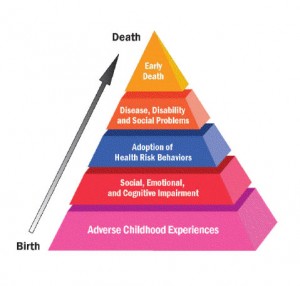The ACE Study
The Adverse Childhood Experiences (ACE) Study examined the influence of adverse childhood experiences on the physical, mental, social and economic health of the study participants. The ACE Study was developed by Robert F. Anda, MD, MS, of the Centers for Disease Control and Prevention, and Vincent J. Felitti, MD of Kaiser Permanente.
With more than 17,000 average American participants, the study assessed a wide array of
health and social problems ranging from adolescence to adulthood, and assessed childhood exposure to multiple types of abuse, neglect, domestic violence and serious household dysfunction such as substance abuse. The decade-long study has taught us important lessons about the long term effects of certain negative childhood experiences.
What Are Adverse Childhood Experiences
ACEs are defined as experiencing any of the following conditions in the home prior to age 18:
- Recurrent physical/emotional abuse
- Recurrent neglect
- Sexual abuse
- Mother was treated violently
- Someone was chronically depressed, mentally ill, institutionalized, or suicidal
- Someone abused alcohol or drugs
- Absent, separated or divorced parents
- Incarcerated household member
ACE Study Findings
Information about risk factors for disease has been widely researched and blended into public education and prevention programs. It is clear that risk factors for disease, such as smoking, alcoholism and risky sexual behavior, are not randomly distributed in the population. In fact, persons with one risk factor for chronic disease tend to have one or more other risk factors.
The study found that ACEs are common and tend to occur in groups. Nearly two thirds of the study participants reported at least one ACE. Of those, more than 80% reported experiencing two or more ACEs in their lives, and more than 50% reported three or more categories. ACEs are a strong predictor of later health and mortality risk. A combination of ACEs increases this risk.
ACEs determine the likelihood of the 10 most common causes of death in the US:
- Smoking
- Severe obesity
- Physical inactivity
- Depression
- Suicide attempt
- Alcoholism
- Illicit drug use
- Injected drug use
- Promiscuity
- History of sexually transmitted diseases (STDs)
The ACE Pyramid
The ACE Study tried to answer the question, “If risk factors for disease, disability and mortality are not randomly distributed, what influences precede the adoption or development of them?”
The ACE Pyramid represents a whole life perspective.
The ACE Study uncovered a strong relationship between ACEs and the prevalence and development of risk factors for disease, mental health and social impairment across the lifespan.
For more information about ACE, visit these websites:
www.azpbs.org/strongkids
www.acestudy.org
Ways the Community Can Help
- Be The Best Parent You Can Be. You are an example to your children and others of what it means to be a loving, nurturing, empathetic parent.
- Help A Parent You Know. Be a good listener. Encourage them to join a parenting group where they will receive information and support.
- Speak Out. Speak up when you see children mistreated in public. Offer assistance, and praise parents when children are treated well.
- Help Yourself. Parenting is a tough job. You are not alone if you think you need help.
- Seek out community services for your family or the families that you serve.
- Volunteer Your Time. Parent support programs, drug abuse prevention programs, domestic violence shelters, child crisis centers and other programs will appreciate your time and special talents. More on volunteer opportunities can be found at www.serve.gov
- Raise Awareness. Bring your community together to prevent Adverse Childhood Experiences.
- Report Suspected Child Abuse and Neglect. Child abuse rarely stops without intervention and help. To report suspected abuse or neglect, call 1-888-SOS-CHILD (1-888-767-2445).
Parenting Resources
www.childhelp.org, or 1-800-4-A-CHILD (1-800-422-4453)
www.pbs.org/parents/childdevelopment/
www.cdc.gov/parents
Birth to Five Helpline 1-877-705-5437


